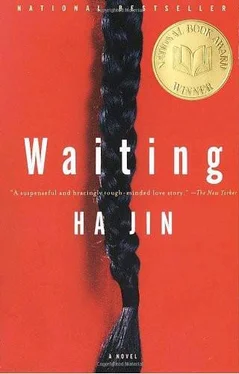Without delay she copied his essay verbatim in a six-page letter, and mailed it to Commissar Wei together with his book.
Then began the long wait.
Manna and Lin thought the commissar would answer the letter immediately, but three weeks passed and no word came from him. They were both anxious.
Meanwhile, Manna was aware that people began treating her differently. The hospital leaders became very considerate to her. Every now and then a nurse would fasten meaningful eyes on her, as if to say, "Lucky girl." Once Manna overheard a young woman whisper to others behind her back, "I don't see anything special in her." As for the officers' wives, one of them asked her, "When are you going to Harbin?" Another reminded her, "Don't forget to send us wedding candies." Some said about the commissar, "What a lucky old man." A few repeated, "Poor Lin."
On such an occasion Manna just kept silent, not knowing what to say. Their words unnerved her, because she had no idea how serious the commissar was about their relationship. Furthermore, even if he offered to marry her eventually, the marriage wouldn't be an ideal one, not based on love or made in her heart. As she had often told Lin, she felt Commissar Wei was more like an uncle than a boyfriend. Probably he was too old to be able to give her a baby. At times she wondered whether she should ask Lin to father a child with her before she left Muji, but she was too ashamed to mention this idea to him. Besides, she was sure he would not do it. It would be too great a risk for her as well — if Commissar Wei found out she was already pregnant, he might have her sent back to the hospital or demobilized.
The week after she mailed the book report, Manna began to learn how to cycle, which would be an indispensable skill if she lived in Harbin in the future. Neither she nor Lin owned a bicycle. Fortunately Lin's roommate Jin Tian had a Little Golden Deer, which stood idle in the bedroom because its owner had been away with a family planning team in the country for the summer. So they could use the bicycle, provided they didn't do any damage to it. There was another problem: they could not practice cycling outside the hospital grounds. But within the compound, in the presence of their comrades, it would be embarrassing for Manna to ride a bicycle with Lin holding its carrier constantly so as to keep her in balance. Few adults were unable to pedal. Manna couldn't only because she had grown up as an orphan, never having had an opportunity to learn.
She and Lin set about practicing on the sports ground at night- fall when they would be less visible. While she was pedaling unsteadily, he kept saying, "Look ahead. Don't think of the wheel."
"I can't," she cried.
"The wheel goes where your eyes go. Try to look at something faraway."
"Like this?"
"Yes, that's good."
She wasn't a slow learner. In just two hours, she could cycle zigzag by herself. But she could not get on or off the bicycle on her own, and he had to run to keep up with her all the time. Whenever she wanted to dismount, he had to bring the bicycle to a stop for her. Another trouble was that she often ran into objects she tried to avoid — once she hit the pole of the soccer goal, and another time a wooden box filled with dummy grenades. The drive chain slipped off several times; Lin managed to loop it back around the sprockets.
Though she was sweating copiously, Manna was having a wonderful time. She was so happy that at the end of the night she wanted to pedal back to the dormitory by herself.
Since it was already dark, Lin let her do that after telling her to be very careful. She cycled away on the dirt road while he followed, jogging and striding alternately. The night was smoky, full of the smell of charred wood. Moths and gnats were swarming around the street lamps, beyond which tree leaves had grown black. Manna turned her head and cried over her shoulder at Lin, "I can ride a bicycle now."
The moment Manna made a right turn, a woman in dark civilian clothes appeared ahead of her, walking in the same direction, her left hand holding a basin against her waist. Manna wanted to keep as clear of her as possible. Yet coming close to her, somehow the bicycle intractably headed for the woman. Manna tried to turn away, but the handlebars seemed to have their own will. In a flash the front wheel hit the woman from behind and got in between her legs. Manna gripped both brake levers and the bicycle leaped with a screech; the pedestrian was tossed up a little and landed on the front fender. Manna let go of the brakes. The woman, astride the front wheel, was carried along on the bicycle for two or three seconds, as if she were an acrobat riding a unicycle. "Oh Mama!" she cried. Her hand was still clutching the yellow basin containing a bundle of laundry and a cake of soap.
Then the bicycle clattered to the ground.
"Are you hurt, Aunt?" Manna asked, having picked herself up.
The woman, remaining on her feet, grumbled, "My goodness, were you aiming for my behind?"
"I 'm sorry. I didn't mean to — "
Suddenly Manna panicked as she recognized the woman was Director Su's wife. She didn't know what to say.
Lin arrived, saying between gasps, "Look at this, look at this! I told you not to ride…" He paused, as he too recognized the woman.
He said to Mrs. Su, "I'm terribly sorry. Are you injured?"
"I'm all right," the woman said, still patting her buttocks. "She was so accurate, man. Caught me right between the legs."
Despite trying hard to restrain herself, Manna burst out laughing. For a moment Mrs. Su and Lin were bewildered, then they both joined her in full-throated laughter. A bicycle whizzed by, its rider whistling loudly, and disappeared in the darkness with the bell still jingling. "Crazy dolt," said Lin under his breath.
Mrs. Su found herself bareheaded, without the hat she had been wearing, her hair still wet from the bathhouse. Lin walked back a few steps and retrieved the hat for her. It was made of black velvet, a standard piece of headgear for a country woman. Once put back on her head, it turned Mrs. Su into a withered crone, since her dark hair had all disappeared from sight. Surprised, Lin looked down at her feet, which were large and manly, in a pair of army sneakers.
They accompanied her all the way to Director Su's apartment, feeling lucky that Manna had not hit a different person. Mrs. Su complained that the bathhouse wouldn't allow her seven-year-old son to bathe with her in the women's area, and that as a result she had asked their neighbor to take the boy home. "What an odd rule. He's just a little kid," she muttered.
Though they were more careful the next evening, Manna rode into a weeping willow. A branch scraped her jaw and left a purple welt there. The bruise was so eye-catching that the following day many people knew what had happened; yet Manna didn't care, eager to continue to practice until she could bicycle with confidence on the streets downtown. But the bruise caught the attention of the hospital leaders, who were alarmed. Manna Wu now was a girlfriend of Commissar Wei. If anything bad happened to her, the top officer might hold them responsible. So they ordered Manna and Lin to stop the practice sessions in case she might hurt herself more.
Finally the hospital leaders heard from Commissar Wei's office. To their disappointment, the commissar had decided to discontinue his relationship with Manna. His aide explained on the phone that the leader had been impressed by her understanding and literary cultivation, but he was not satisfied with her handwriting. Commissar Wei had been a published author for twenty years, and at the moment he was preparing a book manuscript, so he needed someone whose handwriting was handsome to help him with secretarial work.
The truth was, as Ran Su heard afterward, that Commissar Wei had dated half a dozen women at the same time. After careful consideration, he had decided to marry a young lecturer in world history at Harbin University.
Читать дальше











